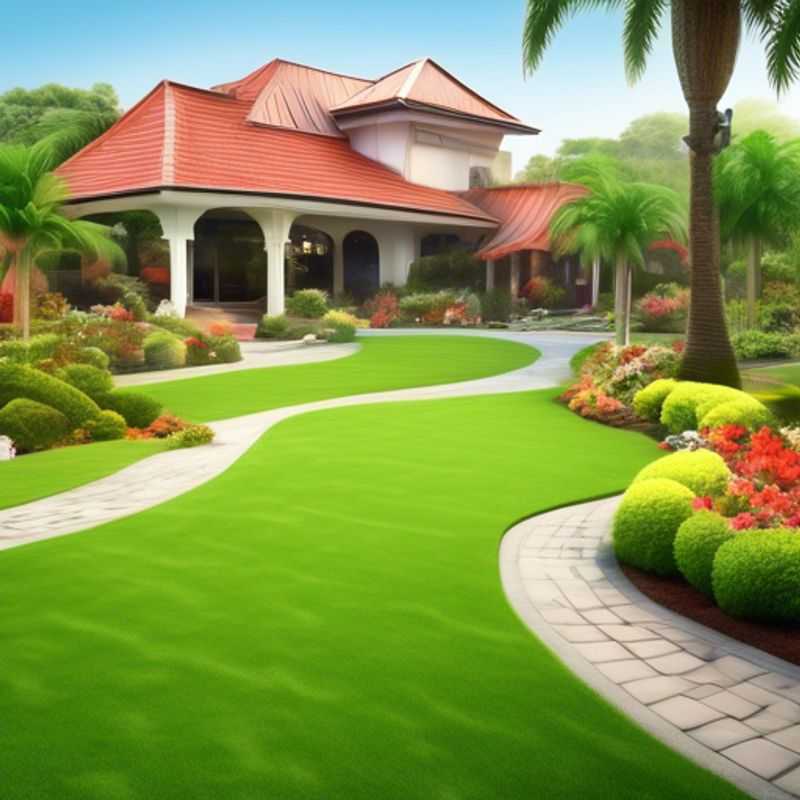Top Things to Know Before Buying Lawn & Garden Supplies Near You

Top Things to Know Before Buying Lawn & Garden Supplies Near You: A Guide for Informed Purchases
Ready to transform your yard into a blooming paradise? Before you head to the nearest lawn and garden center, there are a few key things to keep in mind. These tips will help you make the most of your shopping experience and ensure you get the best possible products for your needs.
First, research local lawn and garden retailers. Compare prices, selection, and customer reviews to find the best fit for you. Take note of their return and exchange policies - it's always a good idea to know your options in case of any unforeseen circumstances.
Next, measure the area you need to cover.

Find the Best Deals: Researching Local Lawn and Garden Retailers
When it comes to your lawn and garden, you want the best products at the best prices. That's why researching local retailers is key! To compare prices and selection, start by checking out online directories. Websites like Google My Business and Yelp often list local lawn and garden stores with their inventory and pricing.
Next, visit local garden centers and nurseries. You can browse their selection in person, get expert advice, and compare prices side-by-side. Don't forget to ask about any special promotions or discounts they might have!
Finally, consider online retailers. While you might not be able to physically inspect the products, online stores often offer competitive prices and a wider selection. Remember to factor in shipping costs and delivery times.
By taking the time to research, you can ensure you're getting the best value for your money on all your lawn and garden needs. Happy gardening!

Return and Exchange Policies: A Must-Read Before You Buy
Before you buy anything, it's a good idea to check the store's return and exchange policies. This might sound like a small detail, but it can save you a lot of hassle and frustration later on. Policies can vary widely, so it's important to understand what you're getting into before you make a purchase.
Here are some key things to look for:
Return window: How long do you have to return an item? Some stores offer a generous return window of 30 days or more, while others might only give you a week or two.
Exchange policies: Can you exchange an item for a different size or color? What about a different product altogether?
Conditions for returns: Are there any specific conditions that need to be met in order to return an item? For example, some stores require that items be unworn and have all original tags attached.
Return process: How do you go about returning an item? Can you return it in-store, online, or both? Do you need to get a return authorization?
Shipping costs: Who pays for return shipping? The store or the customer?
By taking a few minutes to read the return and exchange policies before you buy, you can avoid surprises and ensure that you're happy with your purchase.

Measure Twice, Buy Once: How to Calculate the Right Amount of Supplies
When tackling a project that requires materials like paint, flooring, or landscaping, it's crucial to accurately estimate the area you need to cover. This helps avoid overbuying and wasting supplies, saving you both money and frustration. Let's break down how to measure the area you need to cover efficiently:
First, you need to determine the shape of the area. Is it a simple rectangle, a square, a circle, or a more complex shape? For rectangular or square areas, simply multiply the length by the width. For example, a room measuring 10 feet long by 12 feet wide would have an area of 120 square feet (10 feet x 12 feet = 120 square feet).
For circular areas, use the formula πr², where π is approximately 3.14 and r is the radius of the circle (half the diameter). For irregular shapes, you can break them down into simpler shapes (rectangles, triangles, etc.) and measure each individually. Then, add the individual areas together to get the total area.
After calculating the total area, it's essential to consider any factors that might affect the required amount of supplies. For example, when painting, you'll likely need to apply multiple coats, increasing the total paint required. Similarly, when laying flooring, you should factor in waste due to cutting and fitting.
Always purchase a small excess of materials to account for unexpected situations or mistakes. Consult the product's packaging or manufacturer guidelines for information on coverage rates and recommended overage. This ensures you have enough supplies to complete the project efficiently without having to make last-minute trips for more.

Hunting for Deals: Look for Sales, Coupons, and Seasonal Discounts
Looking for deals is a smart way to save money on purchases. There are various ways to find sales, coupons, and seasonal discounts.
Websites and Apps: Many websites and apps specialize in finding and listing deals. Some popular options include RetailMeNot, Coupons.com, and Honey.
Store Websites and Email Newsletters: Sign up for email newsletters from your favorite stores to receive notifications about upcoming sales and exclusive discounts.
Social Media: Follow your favorite stores on social media platforms like Facebook, Instagram, and Twitter for announcements of sales and promotions.
Store Loyalty Programs: Joining store loyalty programs can often give you access to exclusive discounts and rewards.
Seasonal Sales: Be aware of seasonal sales, like Black Friday, Cyber Monday, and holiday sales, which offer significant discounts on a wide range of products.
Coupon Codes: Before making a purchase, search online for coupon codes specific to the store or product you're buying. Many websites and browser extensions can automatically apply coupons at checkout.
Negotiate: For large purchases, consider negotiating with the seller. This might be especially relevant for items like furniture, cars, or electronics.
Remember that deals and discounts are constantly changing, so be sure to check regularly for the best offers.

Get Expert Advice: Consult with Staff for Product Recommendations
Consult with staff for recommendations on the best products for your needs. This simple but powerful action can save you a lot of time and money in the long run. Here’s why:
Staff are experts in the products they sell. They know the features, benefits, and limitations of each product, and they can help you choose the one that best fits your needs. They’ll also be able to offer advice on how to use the product effectively.
Staff can help you avoid costly mistakes. If you’re not familiar with a particular product, you might end up buying the wrong one or using it incorrectly. Staff can help you avoid these mistakes by providing you with the information you need to make an informed decision.
Staff can offer discounts and promotions. Sometimes, staff can offer special discounts or promotions that you wouldn't find online. This can save you money on your purchase.
When you consult with staff, be sure to ask about the following:
What are the features and benefits of each product?
What are the limitations of each product?
How do I use the product effectively?
What are the warranty and return policies?
Are there any discounts or promotions available?
By taking the time to consult with staff, you can make sure that you are getting the best possible product for your needs.

Planting with Purpose: Matching Plants to Your Local Climate and Soil
Choosing the right plants for your garden is crucial for their success and your enjoyment. One of the most important factors to consider is the climate and soil conditions in your area.
Matching plants to your climate is essential. Sunlight is a key factor. Some plants thrive in full sun, while others prefer shade. Temperature is another important factor. Consider whether your area experiences hot summers, cold winters, or both.
Soil is equally important. Soil type varies greatly, ranging from sandy to clay. Some plants prefer well-drained soil, while others prefer moist soil. Soil pH is another key factor, as different plants thrive in different pH ranges. Knowing your soil type and pH will help you choose plants that will flourish in your garden.
You can test your soil at home with a simple kit available at most garden centers. Alternatively, you can send a sample to a laboratory for analysis. Understanding your soil will guide you towards plants that will thrive in your garden.

Need a Helping Hand? Inquire About Delivery or Installation Services
Need a helping hand with your purchase? Many retailers offer delivery and installation services to make your life easier. This can be a real time-saver, especially for large or heavy items.
Before you buy, inquire about these services:
Delivery: Find out the delivery timeframe, cost, and any potential restrictions on where the item can be delivered (e.g., upstairs, specific rooms).
Installation: Ask about the installation process, if it's included, or if there are additional costs. This might include assembling furniture, setting up appliances, or mounting TVs.
Tips:
Read reviews: Check online reviews to see how others have rated the delivery and installation services.
Compare costs: Get quotes from different retailers to compare pricing and options.
Ask about warranties: Inquire about any warranties covering damages or defects during delivery or installation.
